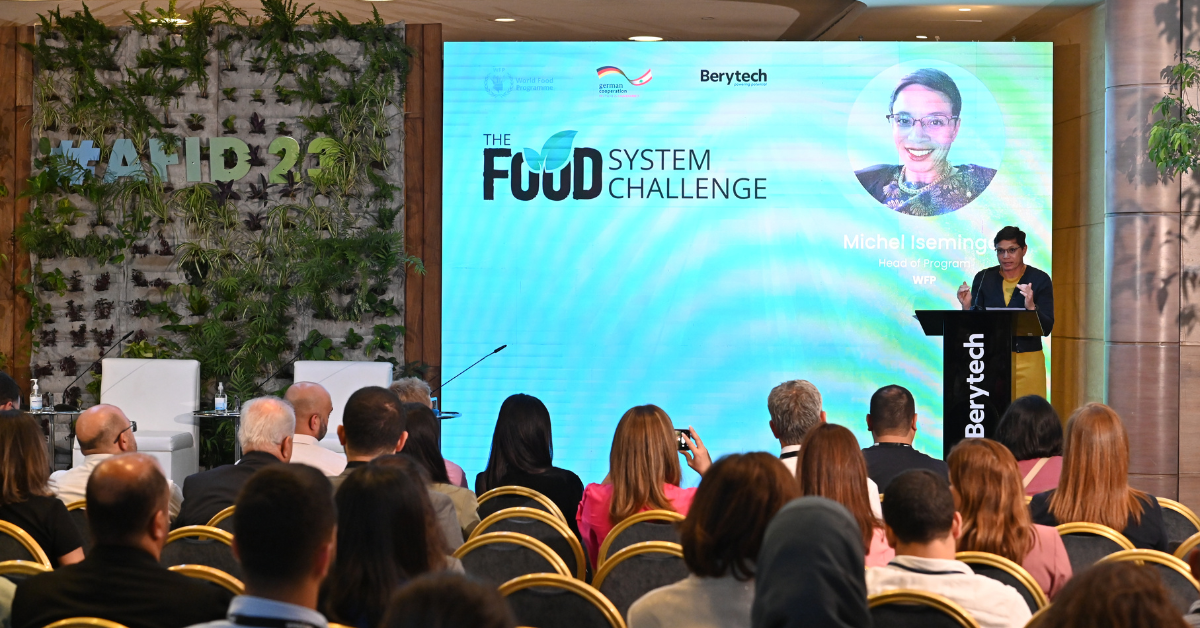Berytech and the World Food Programme celebrated the impact of the Food System Challenge at a ceremony held during The Agri-Food Innovation Days 2023.
The program, launched in 2021, worked to improve food security and increase resilience in the food system in Lebanon through business support, technical assistance, in-kind grants, and support packages to SMEs to enable their ideas and roll out or scale their impactful food system solution.
In the last 18 months, the program worked to increase food security, inclusivity, and employment opportunities, supporting 30 Small & Medium Enterprises as 6 companies responded to access to input challenge, 13 companies responded to import substitution challenges, and 14 companies were supported to use renewable energy.
The Food Systems challenge is implemented by the World Food Programme (WFP) and Berytech through support from the German Federal Ministry of Economic Cooperation and Development (BMZ).
Strengthening the Food System in Lebanon
During the ceremony, Michelle Iseminger, Head of Programmes at WFP Lebanon, announced: “When we were looking for interesting opportunities to strengthen the food system in Lebanon we wanted to make sure that it was demand-driven, and that it supports all the players along the way. This food system challenge was our answer. It’s both an innovation and a competition to invest in the future of high-performing agrifood SMEs, which address three topics: energy efficiency, import substitution, and access to local inputs. So far what I can tell you is that this approach is bringing higher profit margins, more biodiversity, less land degradation, solar transformation, and inclusive support to farmers and cooperatives.
All people should have access to food and be given choices for nutritious, local and safe, low-cost, climate-smart food. Innovative processing technologies are lowering the cost of nutritionally fortified foods, locally grown, and locally processed food to better help food-insecure people to meet their dietary needs.
In his turn, Chadi Abou Nohra, Director of SME Programs at Berytech, explained: We’re looking at enhancing food security in Lebanon but we’re doing it in a very innovative way through the support of high potential, high innovation businesses. We’ve targeted 30 companies. We tapped into the challenges that are related to food security, of course, we tapped into renewable energy, and we also took a big dive into the agricultural supply department. We had to look at the base of the pyramid of food security, having an impact on the most vulnerable and also impacting livelihoods in Lebanon and rural areas. The program also had to create new jobs, we also had to encourage new products that are affordable for the mass, but still with a high innovation factor and a level of quality that is second to none. All of that has been a true challenge but also a very nice journey.”
A Program of High Impact
Fadia Gadban, CEO of Agridev, took the stage to share the evolution of her company with the support that The Food System Challenge provided: “In our sundried tomato production, we received support in 2 aspects. The first is technical support with the team to create a high-quality product and grow the business from one product to multiple SKUs. The second intervention we received from the FSC is through the funds we received to buy equipment to reduce production cost and improve the packaging which will increase the product’s shelf life.”
Rita Dagher, Operations Manager of Natagri, explained how the company worked in the table grape value chain and saw a window market during the export season: “We covered the value chain from farm to export, but there was a small gap in this chain – the grape products that cannot be sold to the export market. We saw great potential in transforming these grapes into raisins. We pitched our idea to the FSC and we had their support to create a dehydration unit to transform all these grapes into raisins.”
Roy Noujaim, CEO of Agrifresh, talked about the launch of Agrifresh dehydrated: we wanted to create a product that can be exported knowing that our current product cannot be exported due to its short shelf life. At the same time, we wanted to use our grade B products from the farm which are of good in quality but bad in shape. By drying them, we can sell them as more valuable products. Thanks to the support of the project, we were able to produce 15 tons of vegetables in the first 3 months coming from 150 tons of fresh vegetables that used to be thrown away.
The project covered 3 cycles, where 10 SMEs were selected in each to undergo a transformational journey, thus targeting a total of 30 Lebanese SMEs working in the food system.
Berytech has provided selected SMEs with a transformational journey package including tailored business development services and technical support. The package also contained in-kind support and milestone-based financial prizes from WFP.










